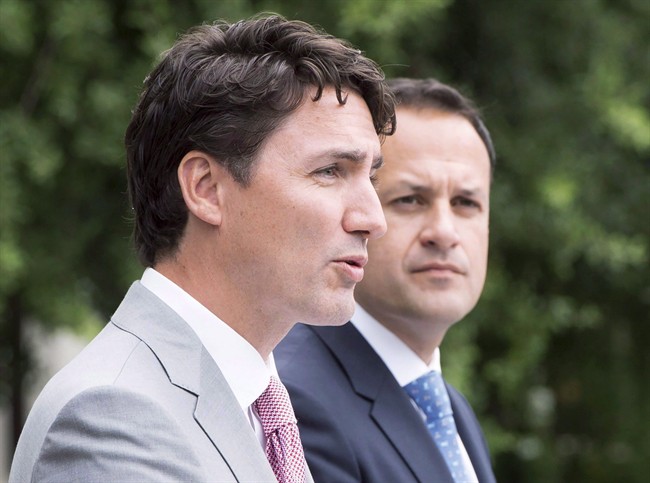When it comes to Canada’s bid for a seat on the UN Security Council, it seems officials have been sizing up the playing field and might view Ireland as stiff competition.

That’s according to briefing memos prepared by Global Affairs Canada that provided a brief assessment of Ireland’s competing bid for one of two rotating seats on the council.
COMMENTARY: Little to be gained by pursuing UN Security Council seat
Prime Minister Justin Trudeau campaigned on a pledge to seek one of the two seats as part of his promise that “Canada is back” on the world stage but the release of the briefing notes comes amid reports that Canada is “dialing back” its efforts to win the seat and increasingly views the bid as a low priority.
“Ireland is currently running for one of two open seats on the UN Security Council for the 2021-22, against Canada and Norway,” reads the December 2017 note.
“Ireland won on the first ballot when it competed against Norway and Italy for a seat for 2001-02, and Irish officials are privately confident that their campaign will be equally successful this time.”
A second version of the note, released to Global News under access-to-information laws, redacted the statement that “Irish officials are privately confident that their campaign will be equally successful this time.”
WATCH BELOW: PM Trudeau discusses what Canada would do with UN Security Council seat if received

Some reports in Irish media quoting UN sources have characterized the bid by Norway as a “fait accompli,” leaving Canada and Ireland to fight it out for the second of two rotating seats on the Security Council for Western European and other states.
READ MORE: Justin Trudeau won’t compromise Canadian values for seat on UN Security Council

Get breaking National news
Ireland won its last bid for a seat in 2001 by a landslide.
Canada withdrew in defeat from its bid in 2010, and the wins fell to Germany and Portugal.
The slate for the 2020 election is highly competitive and experts say trying to split the European vote will likely prove a steep wall for the officials leading the Canadian campaign to overcome.
All three countries are involved in foreign aid and peacekeeping.
When it comes to the latter, the briefing notes make a point of the extensive contributions Ireland has made over the last 50 years — in many cases, to the same UN peacekeeping missions as Canada.
READ MORE: Federal budget 2018: Bono praises Canada’s boost in foreign aid spending
Officials point out in the memo that the country has been a “leading contributor” to UN peace missions, including the United Nations Transition Assistance Group in Namibia in 1989 and 1990 as well as the missions in Kosovo and Bosnia and Herzegovina.
The fact that Ireland has also continued its official development assistance funding to developing countries during some tough recent years is also noted.
“The 2016 ODA budget was nearly $1 billion (about 0.4% of GDP.)”
WATCH BELOW: Liberals unveil new ‘feminist’ foreign aid, but not much new money

Official development assistance is a standardized way for countries to measure how much they spend on international aid.
According to data collected by the Organisation for Economic Co-operation and Development (OECD) using GNI (gross national income) as a benchmark, Irish foreign aid accounts for 0.36 per cent of its annual budget while Canada’s accounts for 0.28 per cent.
Both GNI and GDP are essentially the same in terms of the kinds of results they produce.
Those numbers make Ireland the 12th largest donor when it comes to foreign aid.
Canada sits in the 14th spot.
WATCH BELOW: Ireland votes to overturn abortion ban in landslide vote

Emails also released in the package make note of progress being made towards a referendum on decriminalizing abortion in Ireland.
Last month, the Irish people voted overwhelmingly to repeal the Eighth Amendment of their constitution, which criminalized abortion.
The campaign leading up to the referendum played out heavily on social media and many young Irish led the push.
Trudeau, a vocal supporter for reproductive choice in Canada, had several conversations about the matter with Irish Taoiseach Leo Varadkar last year during reciprocal visits by both leaders to Dublin and Ottawa last summer.
On Dec. 13, 2017, the parliamentary committee studying whether to recommend a repeal of the ban voted in favour of legalizing abortion up to 12 weeks.
“This is big for Justin,” wrote Kevin Vickers, the Canadian ambassador in Dublin, to another official at the embassy.
Trudeau, along with other world leaders including French President Emmanuel Macron and U.K. Prime Minister Theresa May, later praised the outcome of the referendum as a historic victory for the rights of women.








Comments